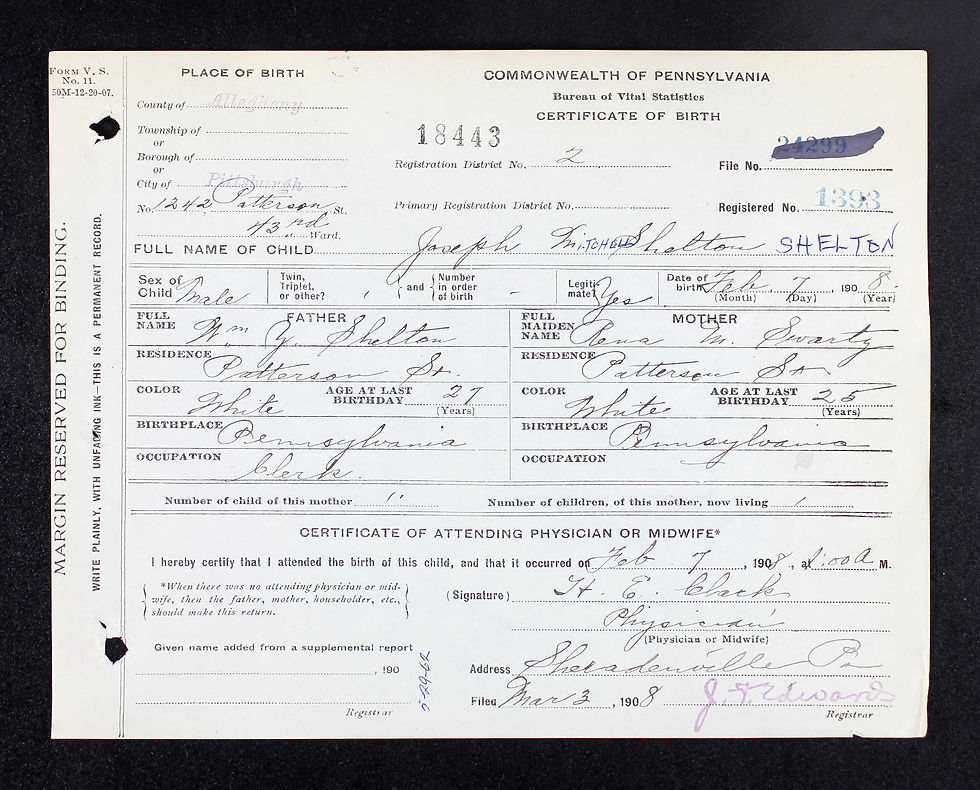What is a Birth Record?
- Brenda Franklin
- Sep 27, 2024
- 4 min read
Updated: Dec 16, 2024
What is a Birth Record?
A birth record is like the official "hello" to the world—a document that marks the very beginning of a person’s life journey. Issued by the government, it’s not just a piece of paper but a keepsake of the moment you first entered the world, providing essential details like when and where you were born, and who your parents are. Beyond its sentimental value, birth records are incredibly important for practical reasons, too. They confirm your identity, your age, and your citizenship, helping to link you to your family history, roots, and even your place in the world. It’s a small but significant part of your story!
Information Found in a Birth Record:
A standard birth record includes:
Full Name: The name of the individual born.
Date of Birth: The exact date when the individual was born, including day, month, and year.
Time of Birth: In some cases, the exact time of birth may also be recorded.
Place of Birth: The location where the birth took place, often including the city, county, and hospital (if applicable).
Parents' Names: The names of both the mother and father, including the mother's maiden name. In some cases, the occupations of the parents may also be included.
Parent’s Residence: The place of residence of the parents at the time of birth.
Sex of the Child: Male or female.
Birth Registration Number: A unique registration number assigned to the birth certificate.
Signature of Attendant: The signature of the person who delivered the child or the person responsible for certifying the birth, such as a doctor or midwife.
Types of Birth Records:
1. Short Form: A summary version of the birth certificate that typically includes basic information such as the individual’s name, date of birth, and place of birth.
2. Long Form: A more detailed version that includes additional information such as the parents' details, place of residence, and possibly the attending physician’s name.
How Can a Birth Record Be Used for Research?
1. Genealogical Research:
Tracing Ancestry: Birth records are fundamental for genealogical research, as they serve as a starting point for tracing family history. They help confirm the full name, birth date, and place of ancestors, making it easier to link family members across generations.
Building Family Trees: Birth certificates offer crucial information about an individual’s parents, which can help researchers build a family tree and trace lineage across multiple generations.
Validating Relationships: By confirming the names of parents, birth records help verify family relationships, ensuring that the correct lineage is being followed.
2. Legal and Citizenship Purposes:
Proof of Identity: Birth records are used to confirm a person’s identity when applying for a passport, driver's license, or government identification.
Citizenship Verification: In some countries, a birth record is a critical document that confirms citizenship, particularly if the individual was born within the country’s borders.
Access to Vital Documents: For legal proceedings, such as inheritance claims, immigration cases, or military service verification, a birth certificate may be required to prove an individual's age, identity, and parentage.
3. Historical and Cultural Research:
Tracking Migration Patterns: By studying birth records over generations, historians can trace migration patterns of families, learning how communities have shifted geographically over time.
Sociological Studies: Researchers can use birth records to gather data on birth rates, maternal age, family size, and other demographic factors that inform social and cultural studies.
Religious and Cultural Traditions: Birth records can reveal information about religious or cultural customs related to naming conventions, family structures, or birth rituals.
4.Medical Research:
Tracking Genetic Conditions: Birth records, especially those that include medical details such as birth weight and parental information, can be used by medical researchers to track hereditary diseases and conditions.
Analyzing Health Trends: Public health officials often use birth records to analyze birth trends, maternal health statistics, and outcomes like infant mortality rates.
Accessing Birth Records for Research:
Government Archives: Birth records are usually stored with a country or state’s vital records office or archives, such as the U.S. National Archives or state health departments.
Genealogy Databases: Online platforms like Ancestry.com, FamilySearch, and MyHeritage offer access to millions of digitized birth records for genealogical research.
Local Libraries and Archives: Many local libraries have historical archives that contain older birth records, especially from the 19th and early 20th centuries, which may not be available online.
Birth records are like the friendly guideposts of life, helping us navigate everything from family roots to official paperwork. They're not just essential for ticking legal boxes, but they’re the starting point for amazing genealogical adventures. Whether you're piecing together your family tree or uncovering long-lost historical connections, birth records provide invaluable insights. Think of them as a bridge between the past and present, linking you to generations of stories, identities, and personal milestones. Each birth record holds the key to understanding not just where we come from, but also how we're all connected in the grand tapestry of family history.





Comments